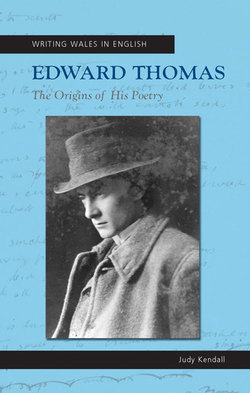Читать книгу Edward Thomas - Judy Kendall - Страница 10
На сайте Литреса книга снята с продажи.
ОглавлениеNOTE ON THE TEXT AND ABBREVIATIONS
Thomas’s editors seem at times to have viewed the provisional quality inherent in his poetry too literally. In PN Review 103, John Pikoulis detailed the liberties taken by R. G. Thomas in the classic Collected Poems (1978). Subsequent editors silently amended some of these, as in the 2004 Faber and Faber re-issue of R. G. Thomas’s edition. In 2008, the record was set straight in more than one sense by Edna Longley’s Edward Thomas: the Annotated Collected Poems, a substantial revision of her 1973 Poems and Last Poems. Her ‘Note on texts’ acknowledges the difficulty of alighting on final versions or titles of Edward Thomas poems, and states her editorial decision to stay with titles that have run the course of time. She generously gives context to apparently high-handed dealings with Thomas manuscripts in the past, revealing how R. G. Thomas’s selection, and creation, of titles for poems in the definitive Collected Poems resulted from lack of access to the printer’s typescript of Edward Thomas’s choice of text in the 1917 Poems. Such scrupulousness asserts Longley’s edition as a genuine contender for the new definitive Edward Thomas text and it remains therefore the main text referred to here, although note is taken of the different versions and successive drafts of poems recorded in R. G. Thomas’s 1978 edition. For the sake of consistency, titles are taken from Longley’s Annotated Collected Poems, but a list of major differences from R. G. Thomas’s Collected Poems appears in the appendices. For frequently appearing sources, abbreviated references are given in the text. Less obvious abbreviations include:
| ANCP | Edward Thomas: the Annotated Collected Poems, ed. Edna Longley (Newcastle: Bloodaxe Books, 2008) |
| Berridge | The Letters of Edward Thomas to Jesse Berridge, ed. Anthony Berridge (London: Enitharmon, 1983) |
| Between | Virginia Woolf, Between the Acts (London: Hogarth Press, 1941) |
| Blackbirds | Edward Thomas, Four- and- Twenty Blackbirds (London: Duckworth, 1915) |
| Bottomley | Letters from Edward Thomas to Gordon Bottomley, ed. R. G. Thomas (London: Oxford University Press, 1968) |
| Celtic | Edward Thomas, Celtic Stories (Oxford: Clarendon Press, 1911) |
| CP | The Collected Poems of Edward Thomas, ed. R. G. Thomas (Oxford: Oxford University Press, 1978) |
| DC | Daily Chronicle (London, August 1901 to February 1913) |
| ETF | Edward Thomas Fellowship Newsletter |
| Eng lett 376 | Bodleian MS, Eng lett c 376, Letters to Walter de la Mare |
| FIP | Feminine Influence on the Poets (London: Martin Secker, 1910) |
| Georgians | Edward Thomas on the Georgians, ed. Richard Emeny (Cheltenham: Cyder Press, 2004) |
| Garnett | A Selection of Letters to Edward Garnett, ed. Edward Garnett (Edinburgh: Tragara Press, 1981) |
| LFY | Eleanor Farjeon, Edward Thomas: The Last Four Years (Oxford: Oxford University Press, 1958) |
| Light | Light and Twilight (London: Duckworth, 1911) |
| NLW | National Library of Wales |
| Norse | Norse Tales (Oxford: Clarendon Press, 1912) |
| Portrait | R. G. Thomas, Edward Thomas: a Portrait (Oxford: Clarendon Press, 1985) |
| PW | Edna Longley, Poetry in the Wars (Newcastle: Bloodaxe, 1986) |
| ‘Reading’ | ‘Reading out of doors’, Atlantic Monthly, 92 (1903), 275–7 |
| SC | The South Country (London: Dent, 1909) |
| Selected Letters | Edward Thomas: Selected Letters, ed. R. G. Thomas (Oxford: Oxford University Press, 1995) |
| Sheaf | The Last Sheaf (London: Jonathan Cape, 1928) |
| Welsh Writing | Judy Kendall, ‘“A Poet at Last”; William H. Davies and Edward Thomas’, in Katie Gramich (ed.), Almanac: Yearbook of Welsh Writing in English (Cardigan: Parthian, 2008), pp. 32–54 |
P. J. Croft notes, ‘the continual fluctuations in shape and size and the flexible spacing of handwritten text cannot be accurately imitated in the relative fixity of print’.1 Reproductions of Edward Thomas’s handwritten orthography in the mechanical medium of print are therefore necessarily approximate. The appendices include an example of his handwriting and original manuscripts are accessible on the Oxford University First World War Poetry Digital Archive. The abbreviations and lack of punctuation in a number of Thomas’s notes and letters are left strategically in place since these reflect their status as immediate comments on his composing processes.
